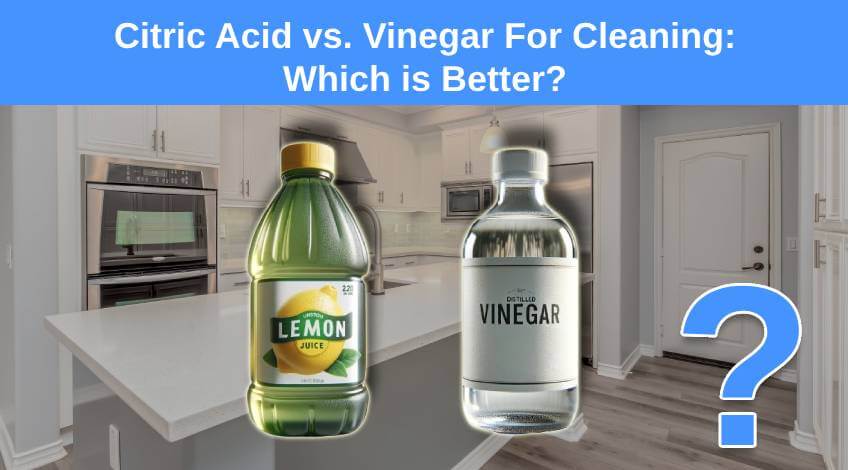
Citric Acid vs. Vinegar For Cleaning: Which is Better?
When it comes to natural cleaning agents, citric acid and vinegar are often the top choices. But which one is better?
Well, it really depends on your cleaning needs and personal preferences. If you’re tackling descaling in the kitchen, citric acid is your friend. For general household cleaning and disinfecting, vinegar would be your best bet.
Let’s have a closer look into these two options, comparing factors like price, shelf-life, and more, to help you make an informed choice!
Comparing Citric Acid and Vinegar
To determine which one is better for your needs, let’s learn more about the primary differences between citric acid and acetic acid, which is found in vinegar.
What Exactly Are They?
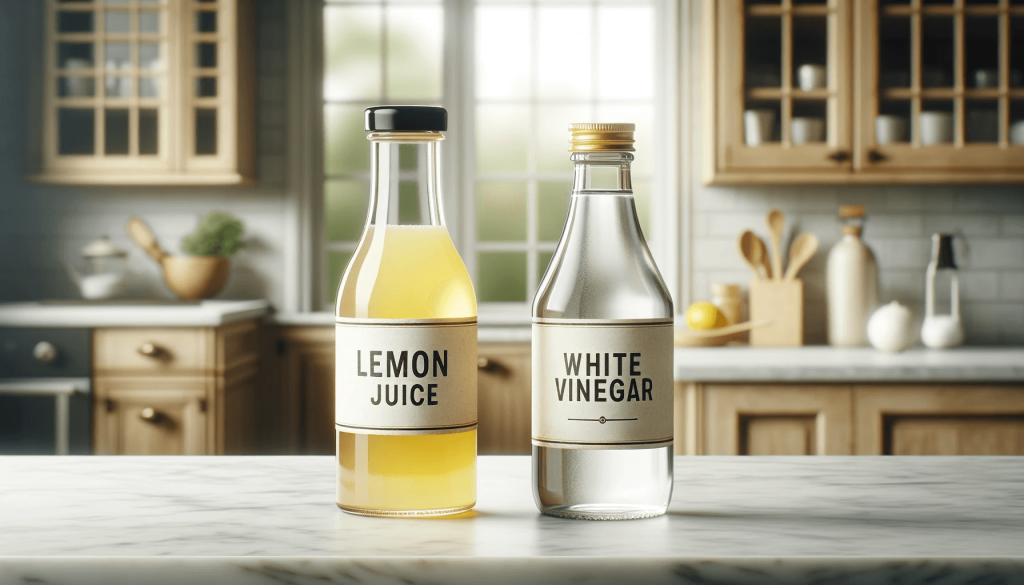
Citric acid is mainly from citrus fruits such as lemons, limes, oranges, and grapefruits. Oftentimes, when we use citric acid in our kitchens, it’s often squeezed from lemons or from a bottle of pure lemon juice from the supermarket.
It is a natural, weak organic acid. It’s known for its sour taste and is a common ingredient in many recipes, but it is not only for use in the kitchen. When it’s in its concentrated form, citric acid is a potent cleaning agent that’s great for breaking down hard water deposits, dissolving rust, and tackling soap scum.
Vinegar contains acetic acid, which is often the result of a fermentation process that ethanol has to go through. Since there are many types of vinegar, it’s worth pointing out that they are also made using different processes and ingredients.
The most common type that’s known as distilled white vinegar is made from grain alcohol. Other kinds such as cider vinegar are made from apples, while rice vinegar is made from, you got that, rice.
Like citric acid, vinegar is a common kitchen staple, and very popular for its cleaning abilities. It’s a mild disinfectant, can remove grease, and works wonders in eliminating odours.
Which Cleans Better?
Both citric acid and vinegar have their strengths. Citric acid is particularly effective against limescale, mineral deposits and rust, making it a go-to for cleaning kettles, dishwashers, and bathrooms.
Citric acid has a pH level of 3 to 6, which makes it effective in breaking down proteins and cleaning grime. It is most effective in areas with hard water, where mineral buildup is a common issue.
Vinegar has a pH level of 2 to 3, and its strong acidity and versatility make it an ideal choice for routine cleaning tasks. It’s great for surface cleaning, glass and mirror cleaning, and can even be used as a natural fabric softener in laundry.
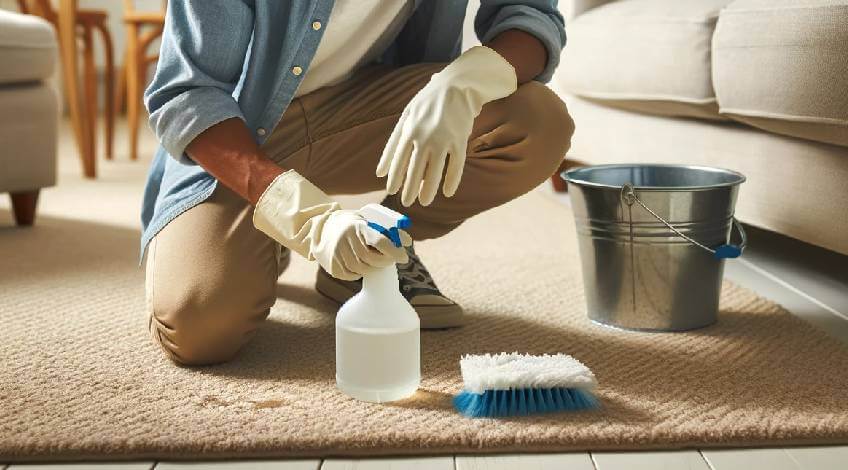
Which Has A Better Smell?
When it comes to smell, it can be difficult for us to tell you which has a better odour between acetic acid and vinegar.
However, more people prefer acetic acid as it has a fresh scent compared to vinegar which could have a pungent and distinct odour. The smell of vinegar will quickly dissipate though, especially if used in a well-ventilated area.
If smell isn’t an issue with you and you don’t think vinegar smells foul, then you may not even notice its scent after using it as a cleaning agent.
Which Is Cheaper And Easier To Get?
When considering cost-effectiveness, vinegar usually takes the lead, especially if purchased in bulk.
A litre of vinegar will cost between £0.70 and £1.40 on average, while a litre of lemon juice can cost around £1.20, depending on the brand.
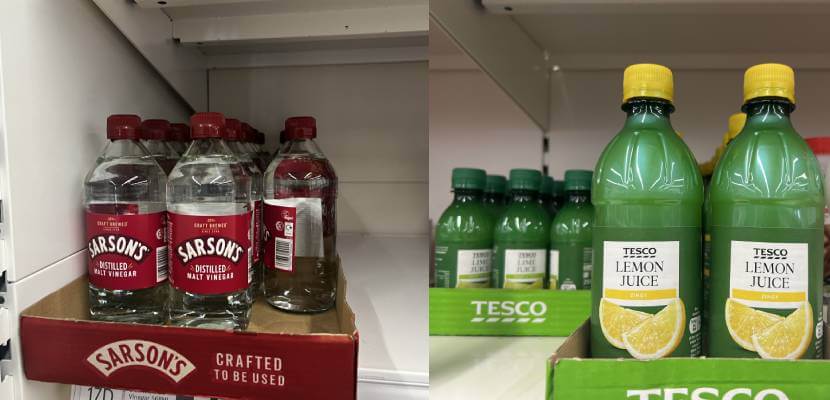
Also, vinegar is more readily available in most supermarkets.
Which Has The Longer Shelf Life?
Both citric acid and vinegar boast impressive shelf lives. However, vinegar, with its acidic nature, can last a few years if stored properly. Citric acid also has a long shelf life but can lose its potency over time.
Of course, citric acid squeezed from fruits will not last a long time. When refrigerated, it could last for 2 weeks. Bottled lemon juice will last depending on the manufacturer, so make sure to check its expiry date!
Which Is Safer To Use?
Both are safe and eco-friendly compared to conventional chemical cleaners. However, vinegar is milder and poses less risk of damage to surfaces or skin irritation compared to the more acidic citric acid.
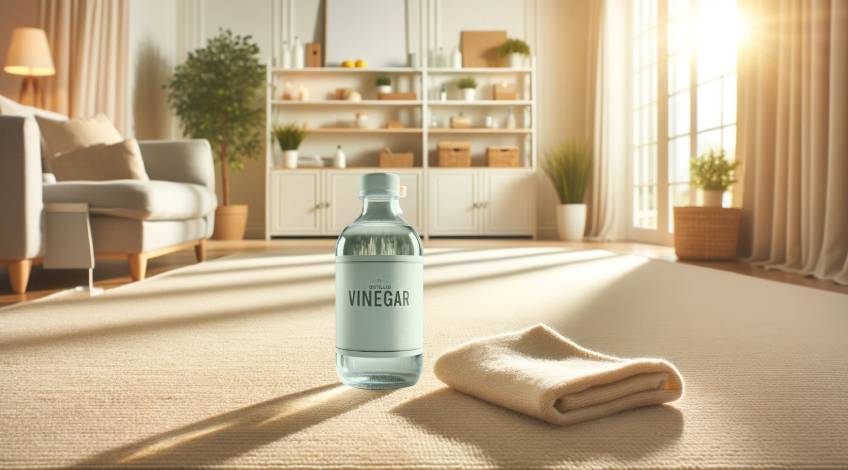
When it comes to surfaces, it’s important to take note of the following:
Citric acid or lemon juice should not be used on granite, marble, stone, wood, upholstery, copper, and brass items as it can corrode the material.
Vinegar should not be used on granite, marble, stone, waxed and unfinished wood, and stainless steel items.
To lessen the possibility of damage to your surfaces and appliances, your best bet will be to dilute the acids with water. The common ratio is 1 part vinegar or citric acid to 2 parts water.
Is It Okay To Combine Citric Acid With Vinegar?
Yes, it is okay to mix citric acid and vinegar together to increase their cleaning effectiveness, especially for challenging cleaning tasks. However, it’s crucial to use this combination cautiously to prevent potential damage to delicate surfaces or materials.
Most people like mixing the two as the citric acid will leave a citrusy scent while vinegar will effectively disinfect and clean most household items.
Other Products You Can Mix With Citric Acid Or Vinegar
If you need a more potent cleaner but don’t want to deal with loads of chemicals, here are other products you can combine with citric acid and vinegar to boost their effectiveness:
Water
Diluting vinegar or citric acid with water, particularly warm water, is a common practice for general cleaning purposes. This makes the solution less harsh and more suitable for use on delicate surfaces, while also enhancing its effectiveness in cleaning surfaces, glass, and removing soap scum.
Bicarbonate Of Soda
Mixing citric acid with bicarbonate of soda results in a fizzing reaction that can help dislodge grime and dirt. This combination is ideal for cleaning drains and removing tough stains. Similarly, vinegar combined with bicarbonate of soda becomes more effective in removing grime.
Washing Up Liquid
Adding a few drops of washing-up liquid to a solution of citric acid or vinegar can significantly enhance its grease-cutting ability. This makes it more effective for cleaning greasy surfaces in the kitchen.
Essential Oils
Incorporating essential oils into a vinegar or citric acid solution not only helps mask the strong smell but also adds additional antiseptic properties. Popular choices for essential oils in cleaning solutions include eucalyptus, lemon, and peppermint.
WARNING: It’s crucial to avoid mixing bleach with citric acid or vinegar, as this can create toxic fumes that are harmful to inhale.
Safety Precautions You Need To Follow
Always Test First
Before applying any homemade cleaning solution to a surface, it’s wise to conduct a test on a small, inconspicuous area. This ensures that the solution doesn’t cause any unexpected damage or discolouration.
Label Your Mixtures
Properly labelling homemade cleaning solutions is particularly important in households with children or pets. Clear labelling helps prevent accidental ingestion and ensures safe usage.
Avoid Harmful Combinations
When mixing cleaning agents, it’s important to exercise caution. For example, vinegar should never be combined with bleach, as this mixture produces harmful chlorine gas, which is dangerous to inhale.
Use Appropriate Containers
Certain mixtures, especially those that cause a reaction (like vinegar and baking soda), should be mixed in open or well-ventilated containers. This helps prevent the build-up of pressure, which can be hazardous.
Citric Acid Or Vinegar – Which One Will You Use?
Ultimately, your choice between citric acid and vinegar depends on your cleaning needs and preferences.
Vinegar is versatile and cost-effective for everyday cleaning. On the other hand, citric acid is better for specific tasks, especially in hard water areas. Both are safe, eco-friendly, and effective, making them excellent choices for natural cleaning.
So which do you need?
SEE ALSO: Is Lemon Juice Good For Cleaning The Floor?
Frequently Asked Questions
You shouldn’t clean granite, marble, stone, wood, upholstery, copper, and brass items with citric acid as it can corrode these materials.
Citric acid typically takes about 5 to 10 minutes to effectively disinfect surfaces, depending on the concentration and the type of bacteria or germs you’re targeting.
To use citric acid for removing limescale, you can create a solution by mixing a couple of tablespoons of citric acid with water, applying it to the affected area, letting it sit for a few minutes, and then scrub and rinse off.
The pH of citric acid typically ranges from 3 to 6, depending on the concentration.
Vinegar should not be mixed with bleach, as this combination produces harmful chlorine gas, which is dangerous to inhale. Additionally, avoid using vinegar on granite, marble, stone, waxed and unfinished wood, and stainless steel items.
Also, follow us on Pinterest ...



